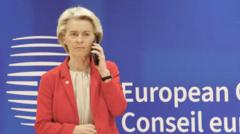The EU's General Court ruled that the European Commission acted incorrectly by denying a request for messages pertaining to negotiations on Covid-19 vaccines between Commission President Ursula von der Leyen and Pfizer's Albert Bourla. This case has emerged as a pivotal moment in the ongoing discussion regarding transparency and accountability within the European Union.
European Court Rules for Transparency, Orders Release of von der Leyen’s Pfizer Messages

European Court Rules for Transparency, Orders Release of von der Leyen’s Pfizer Messages
In a landmark decision, the European Court has condemned the European Commission's refusal to disclose text messages between Ursula von der Leyen and Pfizer’s CEO, stressing the need for transparency in public decisions.
The controversy, referred to as "Pfizergate," initially arose when journalist Matina Stevis revealed private negotiations between von der Leyen and Bourla in April 2021, following Pfizer's partnership with BioNTech for vaccine development. As millions of vaccine orders were finalized, investigative journalist Alexander Fanta submitted a Freedom of Information request to access these texts but was denied by the Commission, which claimed to lack the documents.
Since then, it has come to light that mobile text messages are not systematically recorded as public documents under the Commission's existing transparency rules, raising questions about the importance of verbal exchanges in critical decision-making processes. Following a suggestion of maladministration from the European Ombudsman, Fanta and Stevis pressed legal action to seek access to the contested messages, culminating in this recent ruling.
While the court noted the Commission's reliance on vague reasoning to withhold the messages, it emphasized that transparency is crucial to the credibility of European institutions. The court's decision may challenge the Commission's image, especially as von der Leyen prepares to finalize agreements that shaped the EU's pandemic response. The Commission has stated it would review the ruling and maintain that transparency remains a priority, though the clarity surrounding the use of mobile communications in official matters continues to be a complex issue.
The victory celebrated by anti-corruption advocates signifies a progressive step toward enhancing freedom of information within EU institutions, helping to dismantle barriers that have historically obscured governmental communications.
This ruling opens a drive for reform in public access to governmental communication, ensuring citizens can better hold their leaders accountable for decisions impacting public health and safety.
In summary, the European Court's ruling to release von der Leyen's messages marks a significant step towards increased transparency in the European Commission's operations during the Covid-19 pandemic, potentially reshaping future dialogues on freedom of information within the EU.
Since then, it has come to light that mobile text messages are not systematically recorded as public documents under the Commission's existing transparency rules, raising questions about the importance of verbal exchanges in critical decision-making processes. Following a suggestion of maladministration from the European Ombudsman, Fanta and Stevis pressed legal action to seek access to the contested messages, culminating in this recent ruling.
While the court noted the Commission's reliance on vague reasoning to withhold the messages, it emphasized that transparency is crucial to the credibility of European institutions. The court's decision may challenge the Commission's image, especially as von der Leyen prepares to finalize agreements that shaped the EU's pandemic response. The Commission has stated it would review the ruling and maintain that transparency remains a priority, though the clarity surrounding the use of mobile communications in official matters continues to be a complex issue.
The victory celebrated by anti-corruption advocates signifies a progressive step toward enhancing freedom of information within EU institutions, helping to dismantle barriers that have historically obscured governmental communications.
This ruling opens a drive for reform in public access to governmental communication, ensuring citizens can better hold their leaders accountable for decisions impacting public health and safety.
In summary, the European Court's ruling to release von der Leyen's messages marks a significant step towards increased transparency in the European Commission's operations during the Covid-19 pandemic, potentially reshaping future dialogues on freedom of information within the EU.




















